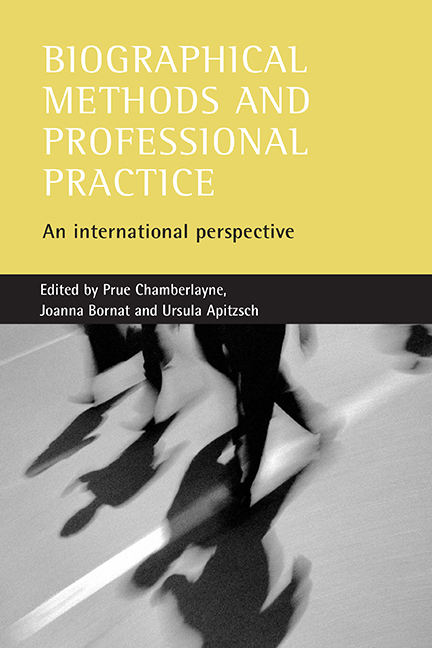Book contents
- Frontmatter
- Contents
- Notes on contributors
- one Introduction
- Part One Putting the subject into policy and practice
- Part Two Subjectivity in context
- Part Three Self-awareness in research and practice
- Part Four Recognising trajectories of disempowerment
- Part Five Biographical resources in education and training
- Index
one - Introduction
Published online by Cambridge University Press: 20 January 2022
- Frontmatter
- Contents
- Notes on contributors
- one Introduction
- Part One Putting the subject into policy and practice
- Part Two Subjectivity in context
- Part Three Self-awareness in research and practice
- Part Four Recognising trajectories of disempowerment
- Part Five Biographical resources in education and training
- Index
Summary
This volume is concerned with the relevance of biographical methods and the contextualised understanding of human agency, as keys in professional interventions. Its interest lies in the usefulness of biographical methods in investigating and generating new forms of social practice and in gaining fresh insights into institutional processes. The contributions to this volume portray ways in which biographical methods have been (or are starting to be) applied in various aspects of professional training as well as in partnership with users of services. The volume evaluates biographical practice against a mapping of practitioner and user positioning and experience. It also does so in different contexts, reviewing developments in policy and practice in a comparative European perspective.
The book profits from lively dialogues in international networks of biographical researchers, and draws on research from a wide range of countries. With such an international perspective, there is inevitably a strong emphasis on issues of migration and cultural diversity, gender, and situations of social transformation.
In this introduction, we clarify for readers our particular understandings of the term ‘professional practice’, and reflect on the differing contexts in which biographically focused professional practice has emerged.
Concepts of professional practice
Our understanding of professionalism concerns relationships of practice where interactions develop and are sustained within contexts that are rarely predetermined or formally defined, and in which the rules of engagement may be shaped under conditions of uncertainty and challenges to established boundaries. This contrasts with a more traditional approach to professional practice, in which social influence and power are what fundamentally differentiates professionalism from other forms of work (Evetts, 2003). It also goes beyond the emphasis on specified codes of conduct, learned and assessed procedures, and membership, which are typically used to define the work and action of occupations such as medicine, accountancy and law. This is not to say that questions of power differentials, knowledge, training and codes of behaviour are not relevant; rather that these more conventional and traditional defining characteristics come to be problematised by a more inclusive and extensive definition. This understanding draws on a wide set of social relationships that are better understood in terms of context and interaction, and consequently biography.
- Type
- Chapter
- Information
- Biographical Methods and Professional PracticeAn International Perspective, pp. 1 - 16Publisher: Bristol University PressPrint publication year: 2004



